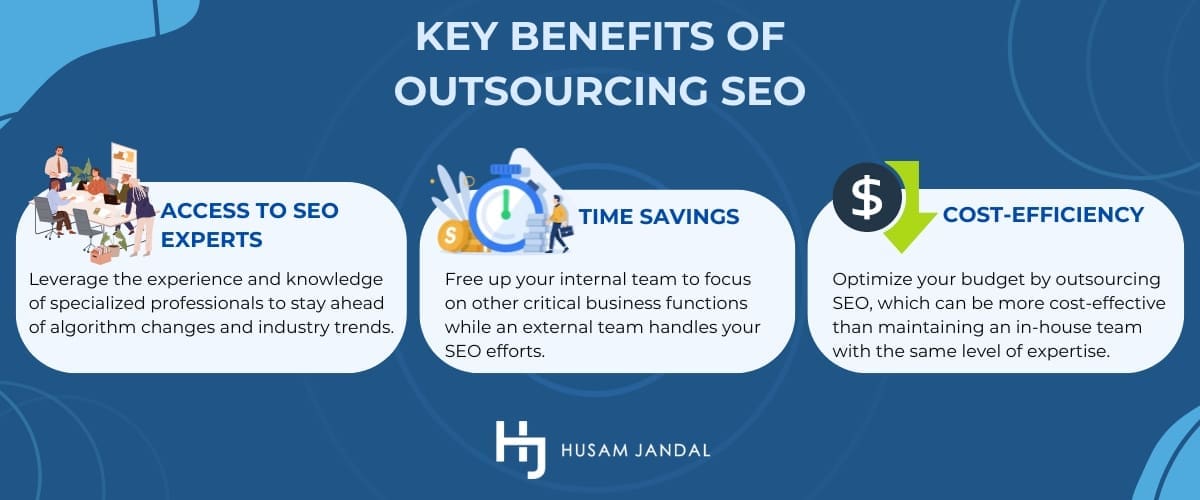
Search engine optimization (SEO) is a digital marketing role that can be outsourced or managed by an in-house team. Your SEO efforts play a critical role in your digital marketing strategy because how well it’s handled determines how you appear in search engines like Google, what your listings look like, and how many new customers you attract via search.
The value of organic traffic to your company website cannot be overstated. Given that there are more than 3.5 billion searches per day on Google alone, tapping into the pool is an opportunity businesses can’t afford to miss.
The question, however, remains: Is SEO expertise something you need to hire an in-house SEO specialist for, or should you outsource it to a good SEO company? Let’s go over some of the factors involved in the decision so it’s easier to see what’s right for your business and what your company needs.
Become Familiar with SEO Roles Before You Decide
Oftentimes, people refer to a singular SEO role, titling the position “SEO Expert” or “SEO Specialist.” The reality is, SEO is a multifaceted job, and when you outsource your SEO, the project is typically handled by a full team. An agency that offers SEO services will typically have an entire team of experts for the different areas of digital marketing. A few of the most common are outlined below.
Keyword Research: Keywords are the phrases people type into search engines when they’re looking for something. During keyword research, a specialist evaluates the actual words people search for, identifies which ones align with the business and its goals, and determines how challenging any given keyword would be to rank well in search engines.
Although the task doesn’t need to be done often, keywords should be evaluated regularly to ensure any new ones are being leveraged and that those being used are still a good fit for the business. This is one of the best ways to ensure you are appearing to your target audience in the search results.
Competitor Research: Speaking in general terms, I tell businesses not to worry too much about what their competitors are doing in their digital marketing or online strategies. It can cause them to lose sight of their own identity and branding. However, when it comes to SEO, it’s always a good idea to look into what competitors are doing. By using this tactic, you know which areas are already saturated by the competition and which opportunities you can capitalize on with greater ease.
Analytics: I separate out the digital marketing analyst’s role in a dedicated piece because it truly is its own role. However, in order to know whether your optimization efforts are working, your analyst must be able to report on various aspects of SEO. You’ll see more on how these roles are intertwined in a moment in the section on SEO KPIs.
Strategy: Using research and analytics, an SEO strategist creates a roadmap of activities to improve the website’s optimization. As with keyword and competitor research, there’s a large time investment at the onset, though as plans are carried out, it becomes more a matter of monitoring the results and making adjustments as needed.
Link Optimization: The links on your pages—whether they work, where they lead to, and the words that are linked—impact how search engines view your site. A link optimization expert will explore all your current links to ensure they’re providing you with maximum value and find opportunities to improve on-page links.
Outreach: Another factor in SEO is your website’s perceived popularity or reputation. Whereas companies in the past tried to game the system by buying links or having links placed on lots of low-quality/ spammy sites, these techniques no longer work and can even harm your ranking today. Outreach specialists help you get high-quality backlinks on reputable websites through things like article placement/ guest posting, providing quotes for articles, and maintaining local listings.
Development: Like analytics, the role of a developer is covered independently too. Many development tasks do not have SEO components, but quite a few do. For example, your URLs’ structure impacts SEO, as does page load times, how pages are coded, .htaccess and robots.txt files, and metadata too. These things may be addressed by your developer or by a technical SEO specialist.
Content Marketing: The role of a copywriter is covered independently too. All your content may not need to be optimized, but things like your blogs, social media, and web pages will get much more mileage if they’re written with SEO best practices in mind and leverage a keyword strategy.
Consider the Resources Necessary to Fulfill the Roles
Skills
- Technical SEO
- On-Page SEO
- Local SEO
- Mobile SEO
- Coding (HTML, CSS, JavaScript)
- Keyword Research
- Analytics and Metrics
- Familiarity with Various Search Engines and Ranking Factors
Tools
- Google Tools (Google Analytics, Google Search Console)
- Moz
- SEMrush
- Ahrefs
- Brightedge
- Majestic
Time
In “Climbing the Digital Marketing Tree,” I describe SEO as “mid-range fruit.” It’s not something you can tackle quickly; it takes time to produce results. Some SEO tasks aren’t done repetitively either. Your research, for example, will be performed once and then left for a while. Your technical SEO aspects may also be short-term work.
Conversely, your link-building and content will likely be continuous, with analytics providing regular insights as to how the work is going. Depending on the scale of your SEO strategy, some of these aspects are full-time jobs by themselves, while other aspects may be project-based or part-time.
Identify What Successful SEO Looks Like to Your Organization
As mentioned, it can take time for SEO results to appear since many factors are involved. For example, if you write a fantastic optimized page and none of your competitors are using the keyword you are for that page, you’re still waiting for Google to crawl and index the page before people begin to see it in search engines.
If competitors are using that keyword, you have technical aspects holding your site back, search engines don’t think your site is the most reliable source for information on the subject, or they don’t trust your reputation, it could take months before you start to see the results.
Particularly in the early days of kicking off an SEO strategy, you want to focus more on measuring things like error resolution and tasks completed versus increased traffic. A few general KPIs for SEO campaigns are provided as examples.
KPIs
- Number of Organic Sessions
- Increases in Keyword Ranking
- Crawl Errors
- Bounce Rate
- Page Bounce Rate
- Backlinks
- Broken Links
- Domain Authority Increases
Making the Final Decision: Should You Outsource Your SEO or Keep it In-House?

As you can see, quite a bit goes into quality SEO. Although you might be able to find a single “SEO Specialist” who can perform all these tasks, more often than not, SEO professionals excel in a single area, and it takes a team to audit and optimize a site well. For most companies, it would be overkill to hire an internal SEO team when specialized, outsourced SEO services are so readily available. You’ll likely get better results, produced more efficiently and cost-effectively, if you outsource to a digital marketing agency or specialized SEO agency.
Get the Digital Marketing Team You Need to Grow
I recently wrote about how your organization’s branding is more important than SEO. It’s worth a read if you haven’t checked it out yet. The short version is that your search engine optimization is crucial, but it shouldn’t be your first priority. There are many steps you should take before touching SEO if you want to ensure it truly bolsters your business.
When you do begin to implement optimization strategies, you also need the right team in place to do it. As a business and digital marketing consultant, this is what I help companies do every day. I bring their marketing efforts into alignment with their business goals and get the processes, resources, and people in place to ensure the company reaches its objectives and gets ROI from digital marketing.
If this is what you’re trying to accomplish, too, reach out to me for a consultation.






































































